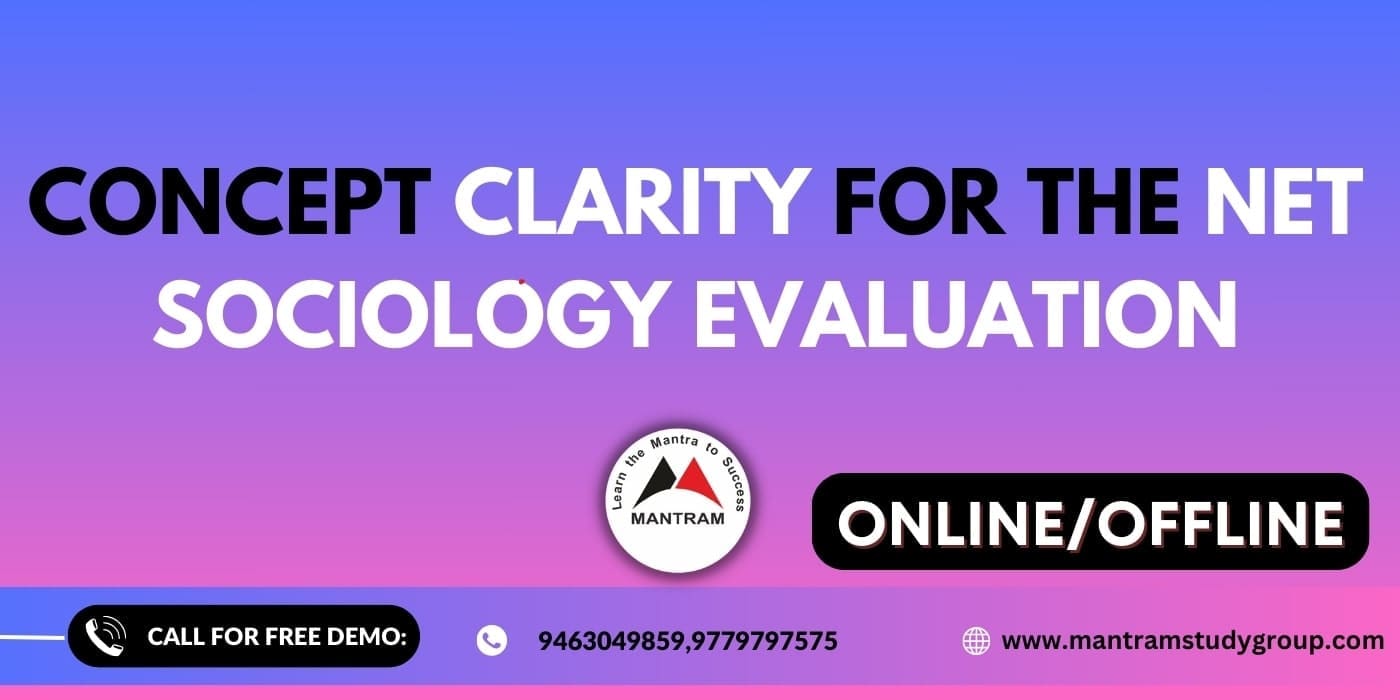
Concept Clarity for the NET Sociology Evaluation
Concept Clarity for the NET Sociology Evaluation
The National Eligibility Test (NET) for appointing sociology lecturers and research fellows evaluates comprehensive understanding across over 300 fundamental concepts integral to the multidimensional subject spanning identity, hierarchy, marginality and behavioral analysis.
Achieving absolute clarity on technical definitions and interpretations of seminal notions is imperative for excelling in the high-stakes assessment.
Classify Concepts
Categorize the 100+ constituent concepts into culture & socialization frameworks; structural dimensions like statuses, roles, and groups; demographic notions of population, migration, and mobility; and behavioral concepts around deviance, anomie and discrimination. Further, it is organized into micro and macro classifications, whether examining small group dynamics or broad institutional systems.
Contextualize Concepts
Rather than simply mugging up dictionary meanings, relate concepts to current social issues often featured in news media and public discourse for enriched understanding. For instance, discuss causes behind growing urban anomie or examine racial stereotyping trends through the lens of ethnocentrism. Such contextualization aids in grappling with key terminology.
For UGC JRF NET Sociology Exam Preparation Coaching, contact us at Mantram Study Group, SCO No. 80-81, First Floor, Sector 15-D, Chandigarh (Near Gate No. 2, Panjab University Chandigarh – Contact – 9779797575/ 9463049859)
Learn Technical Definitions
With each sociological concept having distinct connotations, precisely understand technical meanings around seminal notions like patriarchy, secularization, Sanskritisation, cultural capital, alienation, the underclass, etc., as defined by respective pioneering scholars who originally coined the terms based on studied phenomena.
Review Scholarly Interpretations
Beyond original denotations, analyze how later academics expanded frameworks associated with pivotal notions. For example, review contemporary feminist perspectives debating aspects of patriarchal hegemony influencing social policy issues across ethnicities or economic statuses. Identify interlinkages between structural notions.
Practice Concept Application
Test concept assimilation abilities by consciously applying learnt definitions to analyze causes or implications of current issues spanning gender rights discourse, celebrity culture or technology-accelerated tribal change. Articulate observations using appropriate technical terminology rather than commonplace vocabulary to clarify academic usage.
Attempt Previous Years' Questions
Specifically, attempt the past ten years' concept-based, definitional and descriptor-type exam questions without references to diagnose knowledge gaps around the accurate recall of constituent meanings across both fundamental as well esoteric concepts mentioned sporadically in the syllabus like bellwether states, hypogamy, etc., meriting equal attention.
Learn Relationships Between Concepts
Create visual tools like connection trees, multi-layered thought maps and graphical organizers delineating relationships between concepts categorized as cultural notions (values, folkways, mores); structural concepts (social control, bureaucracy); and concepts explaining theoretical paradigms like Marxism and highlighting interplays between technical terminology.
Stay Updated on Evolving Concepts
Academic interpretations around certain concepts continually evolve, responding to new research insights regarding sexuality discourse, ethnic identities and technology-driven behaviors. Hence, stay abreast of the latest scholarly articulations around previously defined ideas through leading sociology journals and verified online repositories documenting evolving connotations.
Revise Consistently Before Exams
Despite initially grasping concept denotations during preparation, retaining accuracy in recalling over 100 such definitions requires revision consistency. Utilize spaced interval revision techniques for schedule recall practice across fundamental and peripherally touched upon concepts as exam date nears rather than memorizing certain 'high priority' notions.
Conclusion
In summary, acing the NET sociology paper requires imbibing technical precision and intellectual depth in interpreting foundational premises alongside analytical application dexterity regarding the subject's expansive conceptual lexicon spanning multifaceted social realities. Achieving absolute clarity around constituent terminology is imperative for demonstrating the comprehensive mastery expected.
Thanks for visiting our website Mantram Study Group
CHECK OUR OTHER LINKS: -













































